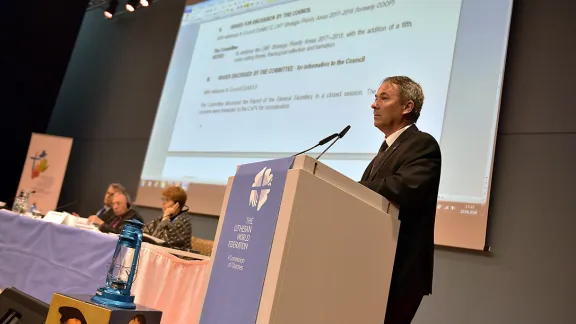
The LWF Council endorsed the report of the Mennonite task force at its June meeting. It was part of recommendations from the Committee for Theology and Ecumenical Relations, presented by its chairperson, Presiding Bishop Dr Miloš Klátik, Evangelical Church of the Augsburg Confession in the Slovak Republic. Photo: LWF/M. Renaux
Churches, theological education institutions to receive “Bearing Fruit” report
(LWI) - Lutherans and Mennonites are discovering practical ways of forging closer relations in their mutual commitment to deepen the healing and reconciliation they expressed six years ago, states a recent report, Bearing Fruit.
The Lutheran World Federation (LWF) Task Force that followed up on the “Mennonite Action” at the July 2010 Assembly developed the report. The reconciliation action at the Eleventh Assembly in Stuttgart, Germany, was the outcome of the international dialogue between Lutherans and Mennonites, which was preceded by discussions at national level, dating back to the 1980s in France and Germany.
The LWF Council endorsed the report of the task force at its June meeting, and recommended it to the member churches for study.
Bearing Fruit says LWF’s action of asking Mennonites for forgiveness has given “rise to new forms of cooperation” and become “a source of inspiration for further joint study, celebration, reconciliation services and joint diaconal projects.”
It reiterates the Lutheran communion’s commitment to its prayer for “forgiveness from God and from our Mennonite sisters and brothers” for the persecution of Anabaptists during the 16th century Reformation and for the “healing of memories and reconciliation” toward the future.
The report is organized in three major parts. The first chapter focuses on how the reconciliation action affects the hermeneutic interpretation of the Lutheran Confessions and Confessio Augustana (CA) in particular. Chapter 2 elaborates on unresolved issues, such as the question of how Christians should relate to civil state and the use of lethal force, and how these can be explored in an atmosphere of mutual openness and willingness to learn from each other. The third chapter describes joint initiatives that were directly inspired by the Stuttgart Assembly action.
Refugee work and local community support
In the chapter describing joint initiatives, Bearing Fruit highlights the MWC’s contribution of USD 369,500 to LWF’s refugee work at Kenya’s Dadaab refugee camp in 2011, as “much more than just financial assistance for the LWF. It was a symbol and an expression of the beauty that grows out of reconciliation between Lutherans and Mennonites.”
The report describes a joint vegetable and fruit garden in Harleysville, Pennsylvania, United States, which since 2013, benefits centers for senior citizens, a social service agency, a food pantry, soup kitchen and other people experiencing hardships.
“The people of Salford Mennonite and Advent Lutheran continue to forge friendships as we serve the same God, side by side, on our knees, as we cultivate our community garden[...] Each Thanksgiving Eve, the congregations join together for a joint service of gratefulness to God for His goodness to us,” Christine Gross of Salford Mennonite, is quoted describing the new-found cooperation.
500 years of the Reformation
The LWF member churches will receive the report as the communion prepares to mark 500 years of the Reformation in 2017. One of LWF’s initiatives is an invitation to its churches and ecumenical partners to join in planting 500 trees at the Luther Garden in Wittenberg, Germany and corresponding trees in their home churches by 31 October 2017. The MWC responded to this call, and then General Secretary Rev. Larry Miller planted a red maple tree next to the LWF tree in 2011. “The trees are a visible reminder […] that both churches have gone through a process of healing memories and that they now live and work together fully reconciled,” the report notes.
Trilateral dialogue on Baptism
The report refers to the trilateral dialogue between Lutherans, Mennonites and Roman Catholics on baptism, describing it as an innovative process to focus “on foundational matters concerning the understanding and practice of baptism.” The dialogue commission which has met several times since 2012 will publish its first report in 2017.
Mennonites’ response
Bearing Fruit includes in its appendices a letter from the MWC to its colleges, universities, seminaries and other institutions, asking them to teach differently about Lutherans, based on commitments the Mennonites made in Stuttgart. The service of repentance at Stuttgart is also presented.
Read the full text of Bearing Fruit – Implications of the 2010 Reconcilitaion between Lutherans and Mennonites/Anabaptists


